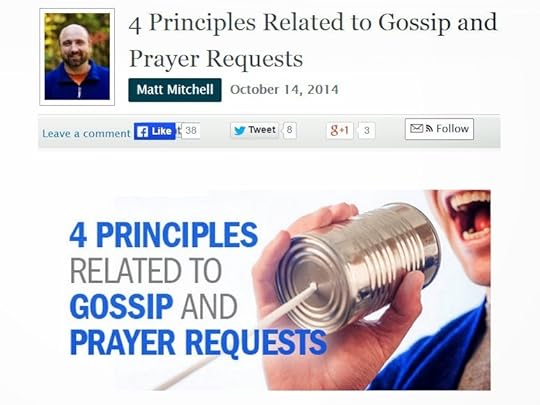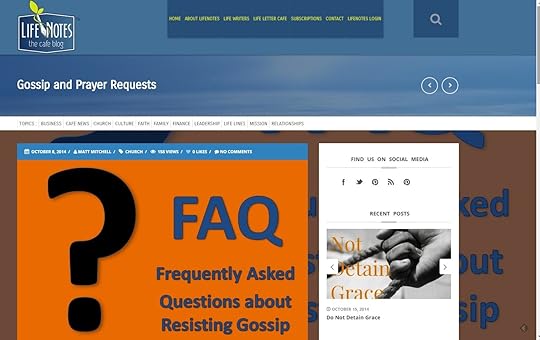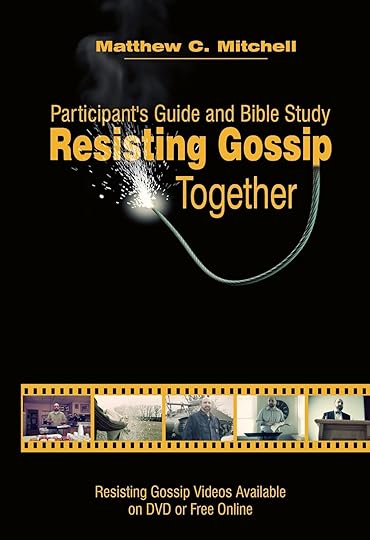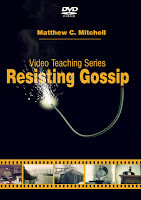Matthew C. Mitchell's Blog, page 110
October 26, 2014
[Matt's Messages] "The Worst News"
 “The Worst News”
“The Worst News”All Roads Lead to Romans
October 26, 2014 :: Romans 3:1-20
This is the sixth message in our series, and we’re almost to the good stuff.
We’re in the “bad news section” of the book of Romans.
In chapter one, we learned that Paul was unashamed of the gospel of Jesus Christ.
He loves the gospel and loves to share it. He wants to share it deeply with the believers in Rome. The gospel is the power of God for the salvation of everyone who believes.
And that power saves because in the gospel the righteousness of God is revealed.
A righteousness that is by faith from first to last.
A righteousness that we need. And that comes to us by faith.
But to understand this gospel, this good news, Paul has to take us first to the bad news. Remember this?
What’s the bad news?
The bad news is that we have a righteousness problem. People are un-righteous.
And because of our unrighteousness the wrath of God is coming.
Romans 1:18 – “The wrath of God is being revealed from heaven against all the godlessness and wickedness of men who suppress the truth by their wickedness...”
We’ve ruined everything.
We’ve exchanged God for stuff. We’ve worshiped the creation instead of the Creator.
Even though God is plainly there in every beautiful leaf outside, human beings suppress the truth about God and reject Him.
And sin.
And sin, and sin, and sin.
It doesn’t matter if they have the Bible, they have creation, and that’s enough to condemn them when they reject the message of creation.
And then last time we studied chapter two.
And in chapter two, Paul turns around and points the finger at Jews.
The Jews, who had the Bible, were tempted to think that they were exceptions to what Paul was saying in chapter one.
“Yes, those dirty Gentiles are sinners. But we’re the Jews.”
“We have the Law of Moses. We have circumcision. We are pretty good people. We’re not like them.”
“We have a birthright and blessings.”
And Paul says, “No. You, too, are under sin.”
Being pretty good is not enough.
Having the Law is not enough.
Being a Jew is not enough to escape the wrath of God.
God is not impressed with your judging the Gentiles because you who pass judgment do the very same things!
And God does not play favorites. It’s not whether or not you possess the Law. It’s whether or not you obey the Law, live the Law, and you have not! Nobody does.
It’s not enough to be circumcised on the outside. You have to have it on the inside.
The Jews do not get a pass.
They, too, are under sin.
We called that last message, “The Even Worse News.”
I’ll bet you can guess the title of this week’s sermon.
It’s called, “The Worst News.”
Before we can get the Best News Ever, we need to see how low we can go.
***
If you were going to try to get some Christians to get along with each other, what would you say to them? Where would you start?
I said this week on Facebook that I’m tired of death. I had a friend from college whose wife died this week of Cystic Fibrosis and Enterovirus. We’ve all lost someone recently, I feel that.
But I’m not just tired of death. I’m tired of conflict. The world is at war. There is so much conflict all around us. And it’s not just out there in the world. Christians are at conflict so much with other Christians.
I can think of 3 good friends right now that are pastors who are experiencing a high level of church conflict. And I’m trying to be a good friend to them, but it’s wearying for me, and I’m not even in the conflict!
And that’s out there. Even in as sweet a church as we have with 122 years of gospelicious history, we can have conflicts with each other. We can grate on one another. We can stop being patient and kind with one another. We can fail to love each other.
So, here’s the question again. If you were tasked with convincing Christians to get along with each other, where would you start? What would say?
The apostle Paul starts with SIN.
Remember, he’s writing to the Jews and the Gentiles who are both now Christ-followers in Rome. There is tension between these two groups of Christians, the Jewish Christians and the Gentile Christians.
And Paul wants to help them to relate to one another in peace and unity.
So, he starts by establish that they are both sinners. Both Jews and Gentiles are equally under the power of sin.
That’s what we’ve seen so far. The Gentiles are sinners inviting the wrath of God even though they know better deep down inside. The Jews are sinners inviting the wrath of God even though they know better because they have the Law.
I almost titled this message, “In the Same Boat.”
Jew and Gentile are in the same boat. The same unrighteous boat.
That’s where Paul has gotten us so far and where he’s going to pound on us in verses 9 through 18.
But first, he’s got to bring up a question or really a series of questions.
Here’s the first question. V.1
“What advantage, then, is there in being a Jew, or what value is there in circumcision?”
Quick. What do you think, knowing what I just said and what chapter 2 was all about, do you think Paul will say?
I would guess, “No advantage in a being Jew.” But he says (v.2), “Much in every way! First of all, they have been entrusted with the very words of God.”
Now, Paul is not saying that the Jews have a salvation leg up on the Gentiles.
But he is saying that it is a wonderful thing, definitely an advantage, to have the words of God.
It was a blessing to be a Jew. They had so much. We’ll see more about that in Romans chapter 9.
It wasn’t something to trust in. Don’t trust in your blessings! But they are blessings.
Especially this one–to be entrusted with the very words of God.
The oracles of God.
The commands, the story, the songs, the promises!
“The very words of God.”
You know, for those of us who are Christians today, that’s a big advantage we have.
Are we taking advantage of it?
Yesterday, I lost my Bible. Pretty embarrassing thing for a pastor to do.
I looked all over and eventually Cindy Green told me where it was via Facebook. It was in this pew over here.
Now, that was my Sunday School Bible. The one I use for studying my lesson and going to class.
But what if I had gone a whole week without any Bible and not realized it until a week later?
Isn’t it an amazing thing that I could own a Bible that I just use for Sunday School, and that I have a whole shelf of them in my office. And multiple Bibles on a database on my computer? And access to even more Bibles online?
How many Bibles do you have? How many have you read this week?
“The very words of God.” What a blessing to have! But are we taking advantage of it?
The Jews, in the main, did not. Paul asks his next question. V.3
“What if some did not have faith [in the very words of God]? Will their lack of faith nullify God's faithfulness?”
Now, you’ve got to understand what Paul is doing here. Paul is arguing here with some invisible people. They are in Paul’s mind. They are people he’s encountered again and again as he’s preached his gospel. They have objections. They have questions. They have arguments.
I’m going to call them the “but, but, but” people.
“But, but, but.” “What about? What about? What about?”
These folks have questions, objections to what Paul is teaching. And Paul brings their questions into his letter to interact with their arguments.
It’s a very effective way of teaching if you can follow it.
I confess that I can’t always follow Paul, and sometimes my brain hurts when I try.
But let’s try to follow him and see where he leads.
Here’s what I think he’s saying. Some people point to the major failure of the Jews to believe the promises of God and keep their end of the covenant as proof that God isn’t keeping His promises.
“What if some did not have faith? Will their lack of faith nullify God's faithfulness?”
What is the answer to that one?
Uh uh.
Paul has a favorite little phrase which in Greek is “may genoito.” The King James version translates it, “God forbid!”
Back in the 90's we would say, “As if?!”
Today, they say, “Seriously?”
I don’t think so.
The NIV often translates it, “May it never be.”
Not in a 1,000 years. Here in verse 4, the NIV translates it, “Not at all!”
“Not at all! Let God be true, and every man a liar. As it is written: ‘So that you may be proved right when you speak and prevail when you judge.’”
Even if every single Jew turned out to not believe the promises, even Abraham himself, God will still be true. God will still keep His promises.
Just like Psalm 51 says, God will be proved to be right when He speaks and prevail when He judges.
God hasn’t failed. And He won’t fail. We’re going to find out that even though it looks in the short run like God’s promises haven’t been keeping up, they certainly will. Paul is going to explain this further in chapter 9 when we get there.
But God is righteous. And it comes out even as He judges the unrighteousness of His chosen people, the Jews.
But that leads to another question. (Do you see how this works?) V.5
“But if our unrighteousness brings out God's righteousness more clearly, what shall we say? That God is unjust in bringing his wrath on us?”
I think Paul means, that if the Jew’s unrighteousness has a certain usefulness to God in highlighting how righteous He is because they failed so miserably, then maybe God is unjust to be mad at them. They were set up for failure to show off God’s righteousness.
What would you say to that?
Paul doubles up his negative response to this question. First he says, (v.5), “(I am using a human argument.)”
In other words, I’m talking like a fool. I am being stupid on purpose. V.6
“Certainly not! If that were so, how could God judge the world?”
That’s the same Greek expression, “may genoito.” Seriously? That’s your question?
“If that were so, how could God just the world?”
It’s just an absurd thought. God is just. He doesn’t do anything wrong. V.7
“Someone might argue, ‘If my falsehood enhances God's truthfulness and so increases his glory, why am I still condemned as a sinner?’ Why not say–as we are being slanderously reported as saying and as some claim that we say–‘Let us do evil that good may result’? Their condemnation is deserved.”
Some people are saying that this is where Paul’s gospel leads you. If you believe the gospel of grace, then you might as well do evil that good will come of it.
And that God is unjust to condemn you for sinning because you’re a sinner! It’s just what you are!
Paul doesn’t even bother to argue with them. He just says, “Their condemnation is deserved.”
It’s not worth an answer.
Now in chapter 6, we’re going to see that Paul actually does do some answering of that question. But not because it has merit.
Here’s point #1 of just 2 this morning.
#1. WE CAN’T WIGGLE OUR WAY OUT OF OUR RIGHTEOUSNESS PROBLEM.
When Paul said in chapter one that people are without excuse, he meant it.
We cannot argue our way out of our righteousness problem.
Our problem is that we are unrighteous.
And there is no wiggle room that comes from trying to nullify God’s faithfulness or say that God is unjust to judge us in our unrighteousness because of course we’re sinners.
There is not “but, but, but!” “What about?” “What about?”
I think that a lot of people expect to get into heaven on a technicality.
There’s gotta be some wiggle room.
“Well, sure, hell exists for Satan and Hitler and Osama bin Laden, but I’m not going there.
I’m sure that God isn’t going to sentence me. We’ll work something out.
He grades on the curve, right?
Isn’t there some small print that says that Americans all get in?
Or church-goers?
Well, what if billions of people rejected Jesus. Would they all go to Hell?
I have a hard time believing that.
I don’t think that we’re all as bad as what you’re saying here. I think we must be missing something.”
There is no wiggle room. No arguing ourselves into Heaven.
No lawyering.
No loopholes.
No excuses.
So in verse 9, Paul comes back to what he was talking about in verse 1. Is there advantages to being a Jew? Yes and No. Yes, it’s a blessing to have the Word. But verse 9...
“What shall we conclude then? Are we [Jews] any better? Not at all!”
Not in any way that saves. I’ve already shown you this. V.9
“We have already made the charge that Jews and Gentiles alike are all under sin.”
There’s no escaping this truth.
Sin is universal. We’re all in the same boat. I don’t care if you are a Jew or a Gentile, you are “under sin.” Under it’s power. Sin is powerful. It’s not just something you do but something that has a grip on you.
And feel the universalness of it. Feel the “all” as Paul begins to quote verse after verse from the Old Testament. Probably from memory. He just reaches back in to his brain and brings out quote after quote about how people are. V.10
“As it is written: ‘There is no one righteous, not even one; there is no one who understands, no one who seeks God. All have turned away, they have together become worthless; there is no one who does good, not even one.’”
Do you feel it?
It comes out in their words. V.13
“‘Their throats are open graves [you can see the corpse in there!]; their tongues practice deceit.’ ‘The poison of vipers is on their lips.’ ‘Their mouths are full of cursing and bitterness.’”
And more than words. Actions. V.15
“‘Their feet are swift to shed blood; ruin and misery mark their ways, and the way of peace they do not know.’ ‘There is no fear of God before their eyes.’”
That’s what people are like.
There’s no getting around it.
As wonderful as people can be, and there are some pretty nice folks out there. Some are better than others.
As wonderful as people can be, this is what is true.
‘There is no one righteous, not even one; there is no one who understands, no one who seeks God. All have turned away, they have together become worthless; there is no one who does good, not even one.’”
Jew or Gentile. V.19
“Now we know that whatever the law says, it says to those who are under the law, so that every mouth may be silenced and the whole world held accountable to God.”
No wiggle room.
The Old Testament has made it clear.
And if you’re a Jew who thinks that all of those passages were just about wicked Gentiles, you haven’t been paying attention.
“...whatever the law says, it says to those who are under the law, so that every mouth may be silenced [no more arguments, no more defense, no more ‘but, but, but’] and the whole world held accountable to God.”
No wiggle room.
And here’s the worst news of all.
#2. WE CAN’T WORK OUR WAY OUT OF OUR RIGHTEOUSNESS PROBLEM.
I mean you might say, “Okay, I’ll stop arguing and get to work. I’ll fix this problem. I’ll be good. I’ll do the Law. I’ll do whatever it says. I’ll do the sacrifices. I’ll do the circumcision. I’ll do the feast days. I’ll do the Ten Commandments. I’ll do all 613 commandments in the Exodus, Leviticus, and Deuteronomy. I’ll get right to work. You’ll see!”
Verse 20.
“Therefore no one will be declared righteous in his sight by observing the law; rather, through the law we become conscious of sin.”
We can’t work our way out of our sin problem.
The wrath of God is coming, and we can’t dig ourselves out of the holes we have dug for ourselves!
The Jews had the Law and they didn’t keep it.
Nobody keeps it.
No one will be justified in God’s sight by works of the Law.
The best the Law will do is show you what kind of a sinner you are. Paul will say more about that in chapter 7. “Through the law we become conscious of sin.”
But law-keeping will not solve your righteousness problem.
If it would, then we wouldn’t have needed Romans 2.
Here’s bad news:
We are bad and God is mad.
Here’s the even worse news:
We have no excuse and no wiggle room and can’t trust in our birthrights or our blessings. Our condemnation is deserved.
Here’s the worst news of all:
We can’t work ourselves out of this problem.
We can’t solve it on our own.
On our own, we are doomed.
Praise God, we’re not on our own!
I’m not going to explain this next paragraph, but I’m going to read it to you. Look at verse 21.
“But now a righteousness from God, apart from law, has been made known, to which the Law and the Prophets testify. This righteousness from God comes through faith in Jesus Christ to all who believe. There is no difference, for all have sinned and fall short of the glory of God, and are justified freely by his grace through the redemption that came by Christ Jesus. God presented him as a sacrifice of atonement, through faith in his blood. He did this to demonstrate his justice, because in his forbearance he had left the sins committed beforehand unpunished–he did it to demonstrate his justice at the present time, so as to be just and the one who justifies those who have faith in Jesus.”
We’ve finally made it back to the Good News!
It’s so good because it answers everything that the Worst News threatened.
We don’t need wiggle room! We have Jesus.
We don’t need to work ourselves out of our righteousness problem, because Jesus’ work solved our righteousness problem!
And now we’re all in the same boat–all of us who believe are in the same boat.
The salvation boat.
With Captain Jesus.
He turns around the worst of news to make it the good news–the gospel.
Have you come to believe the gospel?
Do you understand the bad news? Do you understand your desperate need?
Do you understand how Jesus is the Savior you desperately need?
If you do, then receive Him as your Savior. Your rescuer. Your redeemer.
And if you already have, then praise Him each and every day all day long that He’s solved the problem you never could.
“Pardon for Sin and a Peace that Endureth.”
Pardon for sin?! Not wiggling out from under it on a technicality.
Not digging out from under it through many good works.
But that burden of sin taken away because of what Jesus did for you and that gift of righteousness placed on your account all because of the faithfulness of Jesus Christ.
Great Is His Faithfulness.
***
Messages in this Series
01. All Roads Lead to Romans
02. I Am Not Ashamed of the Gospel
03. The Bad News
04. Hope for Holy Sexuality
05. The Even Worse News06. The Worst News
Published on October 26, 2014 09:00
October 25, 2014
Zinnia "Lilliput"
Published on October 25, 2014 04:00
October 23, 2014
Fantastic Prices on "Resisting Gossip Together" Packs at WTSBooks.com
I am humbled by the strong affirmation of our new Resisting Gossip resources by the folks at Westminster Bookstore.
Today, they announced their special sale prices in their e-newsletter, including a 5/5 pack of Resisting Gossip and Resisting Gossip Together at 47% off the retail price and $36 less than what it would cost on Amazon to buy them!

I was so encouraged by the letter by a WTS staff member included in the special offer. He said:


Amen. May it be so, to God's glory.
Today, they announced their special sale prices in their e-newsletter, including a 5/5 pack of Resisting Gossip and Resisting Gossip Together at 47% off the retail price and $36 less than what it would cost on Amazon to buy them!

I was so encouraged by the letter by a WTS staff member included in the special offer. He said:


Amen. May it be so, to God's glory.
Published on October 23, 2014 08:16
"Songs in the Night" Live & Acoustic by the Gray Havens
Our favorite band has done it again. Dave and Licia Radford have given us another music video in advance of their new album's release on January 6th.
It's live and acoustic, and you can just about feel the heat coming off that fire!

It's live and acoustic, and you can just about feel the heat coming off that fire!

Published on October 23, 2014 05:01
October 18, 2014
Mail Call
Look what came in the mail this weekend!
 Me and
Resistiendo el Chisme
Me and
Resistiendo el Chisme
 Me and
Resisting Gossip Together
Me and
Resisting Gossip Together
 All four Resisting Gossip resources, including the new DVD of the video teaching series!
All four Resisting Gossip resources, including the new DVD of the video teaching series!
Nothing like physical copies to make it all seem real. I'm a blessed man.
 Me and
Resistiendo el Chisme
Me and
Resistiendo el Chisme
 Me and
Resisting Gossip Together
Me and
Resisting Gossip Together
 All four Resisting Gossip resources, including the new DVD of the video teaching series!
All four Resisting Gossip resources, including the new DVD of the video teaching series!Nothing like physical copies to make it all seem real. I'm a blessed man.
Published on October 18, 2014 17:11
Niagra Falls
Published on October 18, 2014 04:00
October 17, 2014
Big Sale at WTSBooks.com!
 Looking for the best prices for Resisting Gossip and the brand new Resisting Gossip Together?
Looking for the best prices for Resisting Gossip and the brand new Resisting Gossip Together?The folks at WTSBooks.com them both on sale here.
The special prices include:
Individual Books
Resisting Gossip Together: $4.00 (20% off)
Resisting Gossip: $8.00 (40% off)
Bundles
5 Book + 5 Participant's Guide Pack - $50.00 (47% off) includes .99 UPS Ground Shipping and free USPS shipping
[Coming Soon] 10 Resisting Gossip Together: $30.00 (40% off)
E-Books
Resisting Gossip ebook: $7.99
Resisting Gossip Together ebook: $4.00
It's so pleasing to see these deep discounts. I hope many small groups take advantage of these offers!
Published on October 17, 2014 05:29
October 16, 2014
"Resistiendo el Chisme" is Now Available on Amazon!
 Rejoice with me!
Rejoice with me!The Spanish version of Resisting Gossip is now available here in the United States on Amazon.
Resistiendo el Chisme is published by CLC Colombia and is made available here in the US through CLC Publications.
I'm so encouraged that this resource can now be accessed by a host of people who would never understand the original version.
A request: If you read Resistiendo el Chisme, I'd really appreciate it if you left a positive review on Amazon.
Published on October 16, 2014 04:00
October 15, 2014
"Gossip and Prayer Requests" Guest Posts
Yesterday, Ed Stetzer and the Biblical Counseling Coalition both ran versions of my "Gossip and Prayer Requests" article on their blogs, which makes 3 guest post versions of the article, including the LifeNotes one from last week.
So encouraging to see this get out to more people!
Ed Stetzer's "The Exchange" Blog

The Biblical Counseling Coalition "Grace and Truth" Blog

Life Notes LifeLetter Cafe


Resisting Gossip Together was released on Tuesday, October 7th.
View The Resisting Gossip Video Teaching Series online or order the DVD.
So encouraging to see this get out to more people!
Ed Stetzer's "The Exchange" Blog

The Biblical Counseling Coalition "Grace and Truth" Blog

Life Notes LifeLetter Cafe


Resisting Gossip Together was released on Tuesday, October 7th.
View The Resisting Gossip Video Teaching Series online or order the DVD.
Published on October 15, 2014 05:07
October 14, 2014
Sweet Tweets
So encouraging to start getting some good feedback on Resisting Gossip Together and the new videos.
Thank you, friends, for helping get out the word these new resources exist!


Thank you, friends, for helping get out the word these new resources exist!
I'm finding these videos by Matt Mitchell (@ResistingGossip) helpful. On the nature of gossip and avoiding it: http://t.co/H84ZXYS74s
— Matt Perman (@mattperman) October 10, 2014
New free video curriculum from @ResistingGossip http://t.co/0oQX31u503
— David Murray (@davidpmurray) October 9, 2014
Looking for a great resource to promote unity in your church? http://t.co/z5g9USirTt @ResistingGossip @alversonboyd @BruceABorders
— David JB Miller (@DavidJBMiller) October 5, 2014
Check out the new Resisting Gossip resources from Matt Mitchell (MDiv '98)! http://t.co/q183AhQLaR
— TEDS Alumni (@TEDSAlumni) October 3, 2014
I want to commend to you my good friend Matt's new video teaching series on resisting gossip. You can find the book and small group...
— Sean Matthew O'Brien (@seanmattobrien) October 6, 2014
Share Check out "Resisting Gossip Teaching Series: Trailer" on Vimeo http://t.co/uHJhfPsWv2 #Vimeo #resistinggossip #mattmitchell
— Ed Catherman (@enc2000) October 10, 2014


Published on October 14, 2014 04:00





